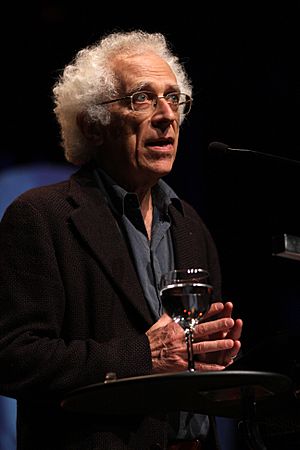Tzvetan Todorov facts for kids
Quick facts for kids
Tzvetan Todorov
|
|
|---|---|

Todorov in 2012
|
|
| Born |
Цветан Тодоров
1 March 1939 |
| Died | 7 February 2017 (aged 77) |
| Nationality | French/Bulgarian |
| Alma mater | University of Sofia University of Paris |
| Spouse(s) | Martine van Woerkens, Nancy Huston (?–2014) |
| Awards | CNRS Bronze Medal, the Charles Lévêque Prize of the Académie des sciences morales et politiques and the first Maugean Prize of the Académie française and the Prince of Asturias Award for Social Sciences; he also is an Officer of the Ordre des Arts et des Lettres |
| Era | Contemporary philosophy |
| Region | Western philosophy |
| School | Continental philosophy Structuralism |
|
Main interests
|
Literary criticism |
|
Notable ideas
|
The Fantastic |
|
Influences
|
|
| Signature | |
Tzvetan Todorov (born March 1, 1939 – died February 7, 2017) was a famous thinker. He was a Bulgarian-French historian, philosopher, and literary critic. He also wrote many essays.
Todorov wrote many books and essays. His ideas were very important. They influenced fields like anthropology, sociology, and literary theory. He also shaped how people thought about history and culture.
Contents
Early Life and Education
Tzvetan Todorov was born in Sofia, Bulgaria, on March 1, 1939. He studied at the University of Sofia. In 1963, he earned a master's degree there.
Later, he moved to Paris, France. He continued his studies at the University of Paris. He earned his Ph.D. in 1966 and another advanced degree in 1970.
Todorov's Career and Works
In 1968, Todorov started working at the French Centre National de la Recherche Scientifique. This is a big research center in France. He became a director of research there.
In 1970, he helped start a journal called Poétique. He was one of its main editors for many years. He also edited a series of books on literary theory. He taught as a visiting professor at several top universities in the United States. These included Harvard, Yale, and Columbia.
Important Books and Ideas
Todorov wrote a total of 39 books. Some of his well-known works include:
- The Poetics of Prose (1971)
- Introduction to Poetics (1981)
- The Conquest of America: The Question of the Other (1982)
- Mikhail Bakhtin: The Dialogical Principle (1984)
- Facing the Extreme: Moral Life in the Concentration Camps (1991)
- In Defence of the Enlightenment (2009)
Todorov was very interested in history. He studied big events like the conquest of the Americas. He also looked at the Nazi concentration camps.
Understanding the Fantastic
One of Todorov's most famous ideas is his definition of the Fantastic. He wrote about this in his 1970 book, Introduction à la littérature fantastique.
He described the fantastic as an event that seems supernatural in our world. When such an event happens, we have to decide. Is it an illusion, or is it truly real?
Todorov used an example from a book called Le Diable amoureux. In this story, a character named Alvaro falls in love. He must figure out if the woman he loves is real or if she is the devil.
Todorov explained that if we decide the event was an illusion, it's called the "fantastic uncanny." This means the event can be explained by normal rules of reality. For example, it could be a dream or a trick of the senses.
If we decide the supernatural event actually happened, it's the "fantastic marvelous." In this case, the rules of reality would have to change. A story is purely fantastic only if the reader can't decide between these two possibilities.
Thoughts on Human Behavior
Tzvetan Todorov also wrote about philosophy. In his book Facing the Extreme, he explored a big question. He asked if extreme situations, like those in Nazi camps or Soviet Gulags, make people lose all their morals. Some people believed that in such harsh places, humans become like animals.
However, Todorov studied stories from survivors. He found that this wasn't always true. He saw many examples of people helping each other. They showed kindness even in terrible conditions. Survivors often said that they could only survive because others helped them.
Todorov concluded that life in these camps was not just about survival of the fittest. He found many examples where people showed compassion and humanity.
Awards and Recognition
Todorov received many honors for his work. He won the CNRS Bronze Medal. He also received the Charles Lévêque Prize. The Académie française gave him the first Maugean Prize.
He was also awarded the Prince of Asturias Award for Social Sciences. This is a very important award. He was an Officer of the Ordre des Arts et des Lettres. He was also a member of the American Philosophical Society. In 2015, he received the Wayne C. Booth Award. This award recognized his lifelong achievements in studying stories.
Personal Life and Family
Tzvetan Todorov came from an intellectual family. His father, Todor Borov, was a famous Bulgarian linguist. His brother, Ivan Todorov, is a well-known mathematician and physicist.
Todorov was married twice. His first wife was Martine van Woerkens. His second wife was Nancy Huston, a writer. They had two children together. He also had a son from his first marriage.
Tzvetan Todorov passed away on February 7, 2017, at the age of 77.
See also
 In Spanish: Tzvetan Todorov para niños
In Spanish: Tzvetan Todorov para niños
- Genre studies
- The Possibility of Hope
 | Frances Mary Albrier |
 | Whitney Young |
 | Muhammad Ali |

